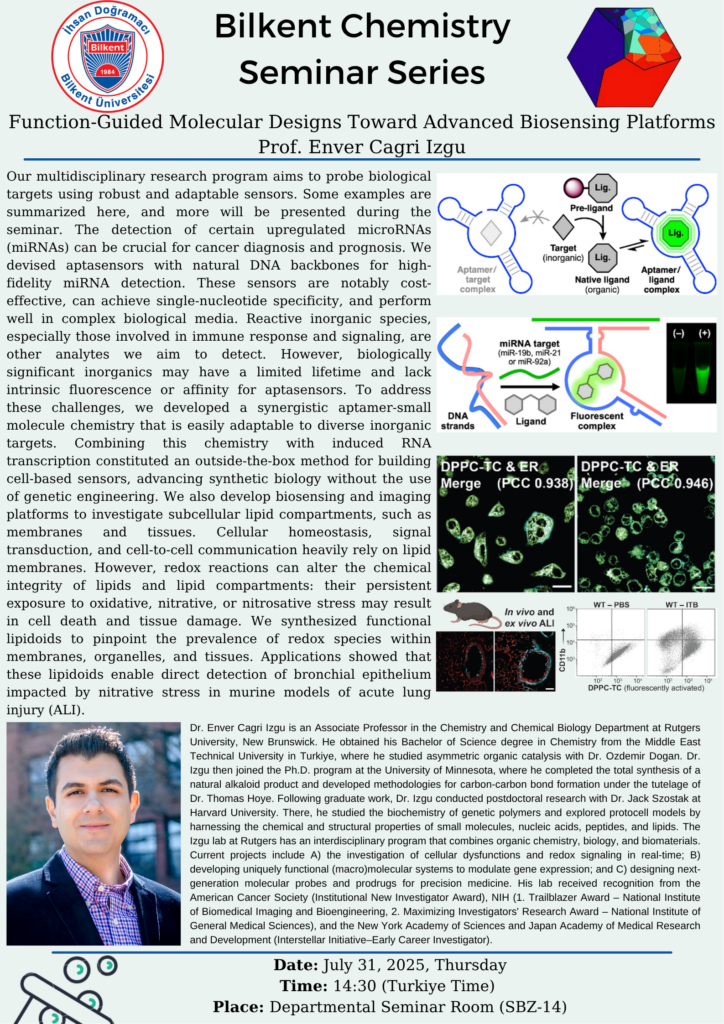Summer ’25 Department Seminars with Prof. Enver Cagri Izgu
Title: Function-Guided Molecular Designs Toward Advanced Biosensing Platforms
Speaker: Prof. Enver Cagri Izgu
Date: 31/07/2025, Thursday
Time: 14:30 (Turkiye Time)
Place: Departmental Seminar Room (SBZ-14)

Abstract:
Our multidisciplinary research program aims to probe biological targets using robust and adaptable sensors. Some examples are summarized here, and more will be presented during the seminar. The detection of certain upregulated microRNAs (miRNAs) can be crucial for cancer diagnosis and prognosis. We devised aptasensors with natural DNA backbones for high-fidelity miRNA detection. These sensors are notably cost-effective, can achieve single-nucleotide specificity, and perform well in complex biological media. Reactive inorganic species, especially those involved in immune response and signaling, are other analytes we aim to detect. However, biologically significant inorganics may have a limited lifetime and lack intrinsic fluorescence or affinity for aptasensors. To address these challenges, we developed a synergistic aptamer-small molecule chemistry that is easily adaptable to diverse inorganic targets. Combining this chemistry with induced RNA transcription constituted an outside-the-box method for building cell-based sensors, advancing synthetic biology without the use of genetic engineering.
We also develop biosensing and imaging platforms to investigate subcellular lipid compartments, such as membranes and tissues. Cellular homeostasis, signal transduction, and cell-to-cell communication heavily rely on lipid membranes. However, redox reactions can alter the chemical integrity of lipids and lipid compartments: their persistent exposure to oxidative, nitrative, or nitrosative stress may result in cell death and tissue damage. We synthesized functional lipidoids to pinpoint the prevalence of redox species within membranes, organelles, and tissues. Applications showed that these lipidoids enable direct detection of bronchial epithelium impacted by nitrative stress in murine models of acute lung injury (ALI).
Short Biography of the Speaker:
Dr. Enver Cagri Izgu is an Associate Professor in the Chemistry and Chemical Biology Department at Rutgers University, New Brunswick. He obtained his Bachelor of Science degree in Chemistry from the Middle East Technical University in Turkiye, where he studied asymmetric organic catalysis with Dr. Ozdemir Dogan. Dr. Izgu then joined the Ph.D. program at the University of Minnesota, where he completed the total synthesis of a natural alkaloid product and developed methodologies for carbon-carbon bond formation under the tutelage of Dr. Thomas Hoye. Following graduate work, Dr. Izgu conducted postdoctoral research with Dr. Jack Szostak at Harvard University. There, he studied the biochemistry of genetic polymers and explored protocell models by harnessing the chemical and structural properties of small molecules, nucleic acids, peptides, and lipids.
The Izgu lab at Rutgers has an interdisciplinary program that combines organic chemistry, biology, and biomaterials. Current projects include A) the investigation of cellular dysfunctions and redox signaling in real-time; B) developing uniquely functional (macro)molecular systems to modulate gene expression; and C) designing next-generation molecular probes and prodrugs for precision medicine. His lab received recognition from the American Cancer Society (Institutional New Investigator Award), NIH (1. Trailblazer Award – National Institute of Biomedical Imaging and Bioengineering, 2. Maximizing Investigators’ Research Award – National Institute of General Medical Sciences), and the New York Academy of Sciences and Japan Academy of Medical Research and Development (Interstellar Initiative–Early Career Investigator).